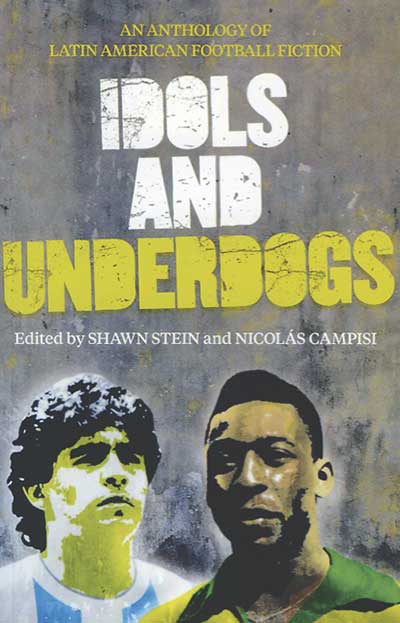
edited by Shawn Stein and Nicolás Campisi
Freight Books, £9.99
Reviewed by Jethro Soutar
From WSC 362, April 2017
Buy this book
As the foreword and introduction make clear, the aim of Idols And Underdogs is to challenge the myth that football does not lend itself to fiction. The editors have scoured Latin America, where football lends itself to everything, and come up with a collection of 11 short stories, one for each country in South America, plus Mexico. Some of the writers are well known in the Spanish-speaking world, but will be unfamiliar to most English readers. Short interviews with the authors follow each of the stories.
The interviews are a nice idea, but curiously unrevealing. They speak of growing up in a football culture, which the book’s American compilers (this is a US project for a Scottish publisher) are possibly in awe of, but is less remarkable to the rest of us.
As for the stories themselves, they are the inevitable mixed bag: The Idol by José Hidalgo Pallares, from Ecuador, is an amusing imagining of a fan’s ordeal when his team signs a goalkeeper he’s mercilessly mocked for years; Team Spirit by Selma Almada is an intriguing tale of female fandom in the macho world of provincial Argentina; Football Inc by Paraguay’s Javier Villeros begins as an entertaining exaggeration of a sponsor’s influence over a team, but gets bogged down with faux live commentaries and match reports.
In many ways Villeros’ contribution epitomises the book and its argument: it would appear to be perfectly possible to write good fiction about football, but fictional accounts of imaginary games tend to be tedious. The stakes are just not as high as they are with a real match, unless the writer has worked very hard to develop character and create drama, and the translator has replicated that hard work.
I’m a translator by trade and it goes with the territory that I’m a more pedantic reader than most – I’ve seen other reviews of this book and none has mentioned the translations – but I’ll try to explain my misgivings. For a work of fiction to really sing, it’s not enough to translate meaning: style must be conveyed, diction controlled, voice reproduced. This takes real skill and, to my eye, the translators and editors of Idols And Underdogs fall short.
For example, Just Like Life by Bolivia’s Edmundo Paz Soldán ends up a mess: it sets out to tell the same story (of a Saturday morning kickabout that turns violent) from multiple perspectives, but the different voices are not distinct enough and it becomes impossible to follow. More generally, there are clumsy turns of phrase on every page, such as the player described as a “difference maker with both legs”. Idols And Underdogs is a refreshingly enthusiastic project and an engaging enough read overall, but a more sure-footed translation might have proved decisive.